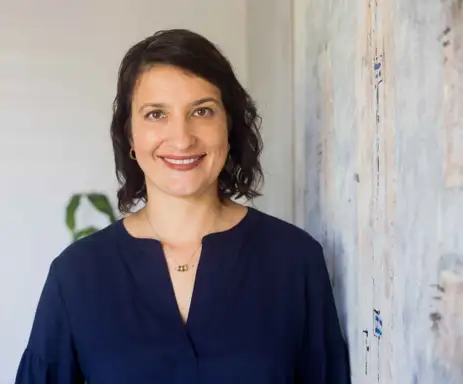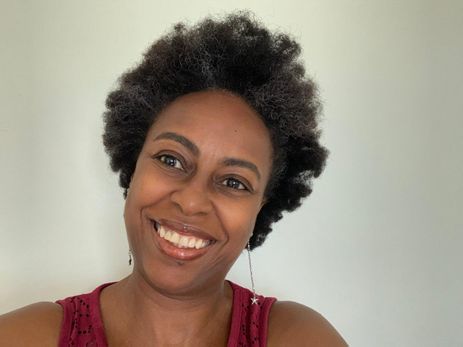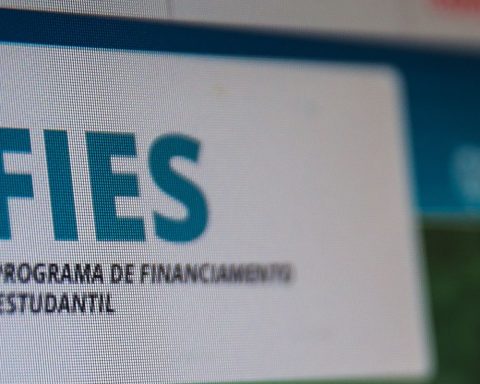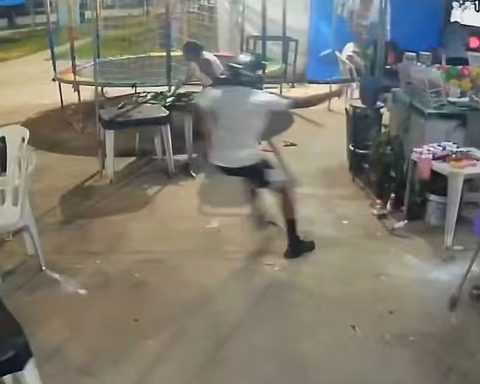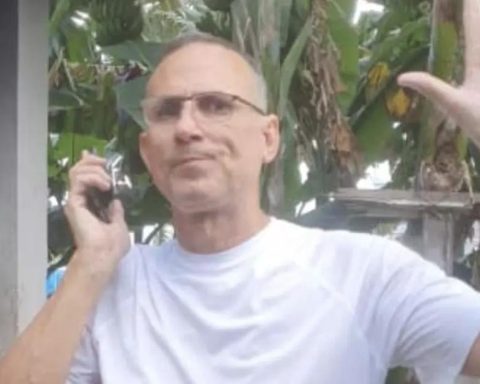Milena Dias, a college student studying journalism in Brasília, says that everyone finds it strange that she doesn’t have a social network. The student believes that this will change at some point, but for now, she likes not being part of the virtual environment.
“I don’t miss posting pictures of myself, I don’t miss seeing other people’s posts, [porque] It is a world separate from reality. It is different from real life, it is a world of stereotypes and, more than that, of a lot of exposure.”
For nutrition student Maria Eduarda Nestali, who also lives in the federal capital, social media is important: “I have WhatsApp, Instagram, TikTok, but I am very careful with the content I watch”, ponders Maria Eduarda.
Studies indicate that the impact of the internet on mental health can be both positive and negative, depending on how it is used. The need to remain connected to the world wide web worries experts, who point to the relationship between excessive consumption of platforms online and mental disorders such as depression and anxiety.
It was while seeking an answer to what was happening to students at the State University of Health Sciences of Alagoas (Uncisal) that Professor Irena Penha Duprat decided to combine her interest in excessive internet use with research on so-called suicidal ideation. This year, she defended her thesis at the University of São Paulo (USP). The Role of the Internet in the Mental Health of Young University Students and its Relationship with Suicidal Ideation.
In 2017 and 2018, Irena Duprat observed an increase in the number of students with mental health problems, such as depression and anxiety, and some suicide attempts, which, according to her, was very worrying. “I wanted to know if excessive use influenced students’ suicidal thoughts,” she explains.
503 students from six health courses were interviewed. “They answered several questionnaires, including a test on internet addiction and one on suicidal ideation, in addition to sociodemographic questions to learn about each student’s profile,” says Irena.
Around 51% of the students were classified as having some type of addiction: mild, when the person uses the internet a lot but is aware of it and manages to stop; and moderate and severe, when there is no longer any such awareness. Irena explains that, in these last two cases, the addiction is compared to any other, without limits. “In the case of suicidal ideation, in the questionnaire, we had a prevalence of 12.5% of students with present ideation”, she reveals.
Eleven of the interviewees with depressive symptoms had a higher frequency of suicidal ideation, as did those with high levels of anxiety. According to the research, suicidal ideation was higher among students who reported moderate or severe internet addiction.
“The use of the internet [é] as an escape mechanism for various situations in their lives. Especially those who reported problems such as depression, anxiety, stress. They actually used the internet as a refuge to escape from their problems”, points out professor Irena Duprat.
The negative impact is also felt in the case of exposure on social media such as Instagram and Facebook, especially on women’s mental health. The professor says that, for young women, it is “something that influences suicidal thoughts, especially in relation to content that can generate feelings of inferiority and low self-esteem.”
“Why? Because we look at those social networks, the influencersand people seem to be happy. Women present the ideal of beauty that those who are looking at it often do not feel that way”, he highlights.
>> Listen more: The impact of social media on mental health
Internet as an ally
Psychologist Karen Scavacini, from the Vita Alere Institute, who is dedicated to suicide prevention and postvention (support in the grieving process), also believes that the use of technology can be positive or negative.
“It is difficult for us to establish what starts first, whether it is excessive use of technology that leads to mental health issues or influences mental health issues; or whether people are already dealing with mental health issues and end up making excessive use of networks because of this,” highlights psychologist Karen Scavacini.
Karen believes that the impacts depend on people’s vulnerability, whether they are going through difficult situations, or have an untreated or undiagnosed mental disorder. They are also related to the hours of use and how this use is – whether it is more passive or more active.
Another factor that deserves attention is what the network has offered to users depending on the content they search for, based on the algorithms. “If someone goes and searches for depression, what information does she get? If she searches for self-harm, if she searches for suicide, what does she find? So, what do the networks offer in terms of content?”
The psychologist points out that, in many cases, people turn to social media to find groups to belong to, to talk to and ask for help. She cites recent research that shows that many young people, for example, have been searching the internet for information about mental health and how to overcome prejudice and stigma regarding the subject.
THE Vita Alere Institute offers free, open-access educational materials. From a deck of cards that can be used in the classroom by teachers to address the topic of preventing online suicide, to a guide for parents and educators on screen time. Last year, the institute opened an innovation center for studies in mental health, technology and suicidology.
The institute also offers the Mental Health Mapa national mapping of free mental health care locations in the country. Interested parties can access the Technology Mapwhich shows specific help locations for people who are experiencing or have experienced violence online.
Karen Scavacini highlights that, nowadays, technology can work as an ally and mentions, for example, applications that indicate where to look for information and other types of help for people in suffering.
>> Listen more: how the internet can be a tool for suicide prevention
Another example is virtual therapies developed for some specific types of care, such as in the case of people with post-traumatic stress disorder, in addition to the use of games to help children with attention deficit hyperactivity disorder. “Technology also offers new treatments and alternative or complementary forms of treatment for mental health,” he points out.
The psychologist advises those interested to seek reliable sources, such as the World Health Organization (WHO), the Brazilian Association for Suicide Prevention, the Brazilian Association of Survivors Bereaved by Suicide and the Vita Alere Institute itself.
For Irena Duprat, who conducted the study on the internet and suicidal ideation among university students, there needs to be awareness about the use of networks. After all, technology is here to stay.
“It is inevitable that the internet is part of everyone’s life. It brings benefits, we cannot only think about the negative side. It is one of the greatest technological revolutions of the last 20 years, but, as everything in excess can bring something harmful, it can also do harm. So, we need to work on this awareness of using it in moderation. It is about knowing to what extent this use can really bring benefits or harm”, he argues.
Internet addiction can be treated with psychotherapy and, in some cases, with medication, combined with treatments for depression and anxiety.
Student mental health
Some universities have initiatives focused on students’ mental health. This is the case of the Fluminense Federal University in Campos dos Goytacazes (UFF Campos).
Bruna Oliveira Silva is a senior psychology student. For her, college life is not easy. “Being in an academic environment, where we are often subjected to exhausting routines, related to the pressure of disciplines, with deadlines to meet. The fact of being away from our family nucleus, as is the case for many students at our campus. It is very difficult and requires a lot of mental effort from students.”
With the increase in complaints associated with students’ mental health, identified by student assistance, UFF Campos developed, in 2017, the Cuca Legal project, a partnership between the team of social workers and professors from the Psychology Department.
At Cuca Legal, students can talk about their anxieties and doubts, in addition to learning some skills necessary for the university environment, as highlighted by the professor of the Psychology Department Ana Lúcia Novais Carvalho. The project has monthly meetings, weekly workshops and maintains a Instagram profile.
In this case, according to Ana Lúcia, the social network is a type of psychoeducational intervention, “where we identify which topics are most frequently addressed by students.” “For example, the issue of sleep. Sometimes we may not value the need for sleep very much, but sleep can have a significant impact on our own mental health.”
Students who need assistance receive individual care from student assistance. A psychologist provides the services. Referrals are made within the institution itself, when necessary, and, if applicable, to the state health network.
>> Listen more: UFF project focuses on the mental health of university students
The Unified Health System (SUS) has the Psychosocial Care Network (RAPS), dedicated to caring for mental health.
Yellow September
According to the World Health Organization (WHO), from 2000 to 2019, suicide was the fourth leading cause of death among young people aged 15 to 29 worldwide.
Throughout the month of September, health professionals are stepping up their actions focused on mental health and raising awareness about the importance of preserving life. This is the campaign Yellow Septemberto raise awareness about the importance of suicide prevention.
Psychologist Karen Skavacini emphasizes the need for schools to participate in this process and highlights the importance of talking openly about the subject. “When we talk openly about a subject, we have the ability to change things in relation to it, so I would say that we should take advantage of this month to reflect on our role and to expand this knowledge and care to all the other months.”
Anyone going through a difficult time can find help in Psychosocial Care Centers (CAPs) and in the basic health units, or at the Life Appreciation Center (CVV), which can be reached by telephone at 188 or by Internet.


